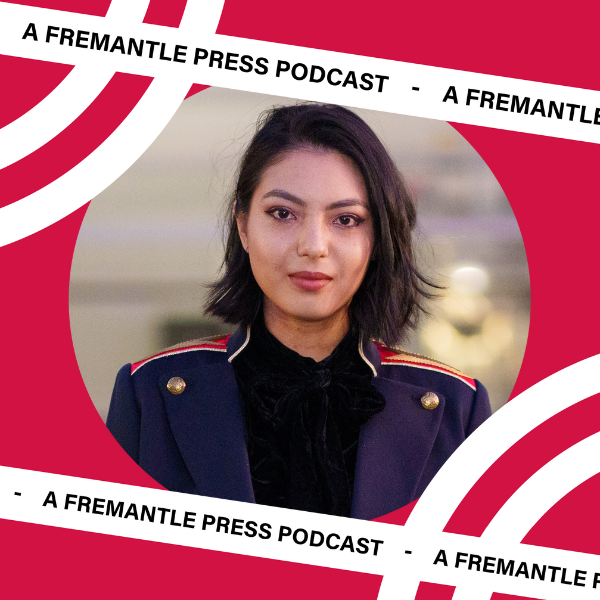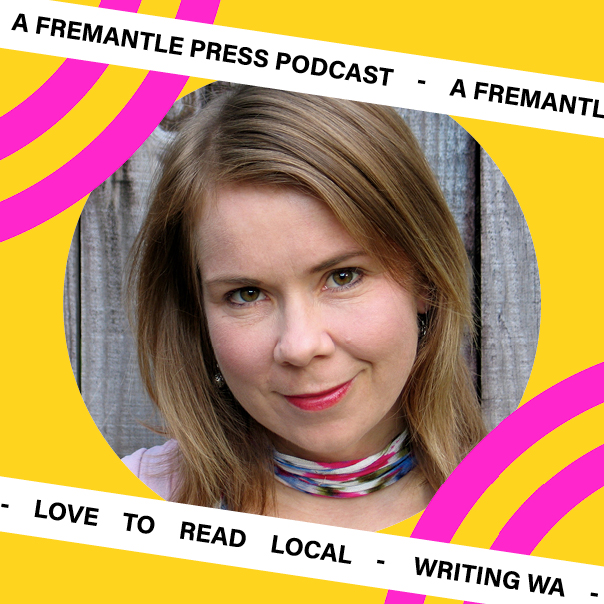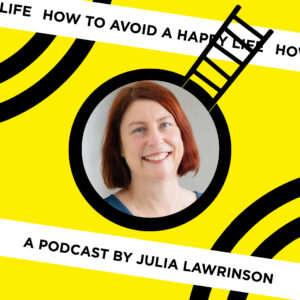Episode Transcript
[00:00:14] Speaker A: Hello and welcome to this special City of Fremantle Hungerford Award edition of the Fremantle Press podcast.
Today we are recording on Wali Lap in Wadjak Nogabuja, and I'd like to acknowledge our first storytellers along with noongar elders past and present.
My name is Clare Miller and I'm here with fiction publisher Georgia Richter to introduce you to one of four writers shortlisted for the city of Fremantle Hungerford award and anxiously awaiting the announcement.
[00:00:45] Speaker B: Hey, Claire, don't you love Hungerford season?
[00:00:47] Speaker A: I do. I do feel sorry for some of the writers.
[00:00:50] Speaker B: That's a tough gig.
[00:00:51] Speaker A: It is a tough gig. And today's guest is Howard Mackenzie Murray, whose manuscript is called far from wonderful. Speaking of tough gigs, Georgia, tell us why you've shortlisted this manuscript.
[00:01:03] Speaker B: Clare, far from wonderful was a real standout for me. It's funny and it's sad and engrossing and it's really distinctively quirky. It's got this sorrowful, lovable main character whose name is Maude, as well as some superb scene work and a really unforgettable supporting cast.
There's some difficult subject matter, but this is a really assured author who has a very light touch. And to quote Maud, this one really hit me right in the breadbasket.
I've been very curious to meet Howard Mackenzie Murray. He's a writer who's born on Wajuk land in the settler state of Western Australia and he writes for the theatre as well as writing fiction.
After studying languages and philosophy at UwA and Murdoch University, he lived abroad and he also travelled widely. These days he lives in Fremantle, travels when possible, reads gardens and practises Zen.
[00:01:59] Speaker A: Howard, welcome and congratulations.
[00:02:01] Speaker C: Thanks very much.
[00:02:02] Speaker A: Can you start by telling us a little bit about your manuscript?
[00:02:05] Speaker C: I'd probably describe it as a funny, sad story.
The arc of it is loosely arranged around the odyssey in that it's like a journey home story. The heroine of my novel, she goes through a series of trials.
She faces her demons and maybe the demons of the world in order to arrive home or to make a home. Maybe it's told in the first person, so it's more Tarkington telling the story. She's a 21 year old med student and she lives in Perth and it spans a 24 hours period. It encompasses her 21st birthday and her brother's funeral. So it's a big day for her and it starts with this sort of big, chaotic energy and she's running from her friends and her family. She's running from her sadness, the loss of her brother. And so the reader is sort of invited to follow along and, I guess, see if Maud can slow down that crazy momentum and face life, face reality, and maybe find a home for herself.
[00:03:09] Speaker B: Howard? I absolutely loved the way that it was set within the parameters of 24 hours, a night and a day, and that kind of rushing, tumbling narrative. It's interesting to me that you describe it as the odyssey, too, because it's also like a whirlpool if we descend through layers. But what's interesting is you set yourself as a writer. This challenge of 24 hours, when a lot has to happen, we have to understand a whole history and a whole lifetime within that.
Was that a challenge that you set yourself, and was it challenging to do so?
[00:03:43] Speaker C: Oh, my God, yes, it was. It wasn't a challenge I set myself. I thought.
I thought I was playing to my strengths because I like that compactness. I like reading plays because you read them virtually in real time, and there's this intimacy that I love. So I wanted to do that. Only when I finished the original first draft of the manuscript that I realized the challenge of it did I realize that in that 24 hours period, I actually had to fit a lot of information, a lot more information than I had originally given to kind of give it context, to catch it and to frame it so that the reader would know why all these characters are behaving so, so crazily. Because it's a very. It's a very emotional 24 hours, and it's a lot of backplot and a lot of stories that lead up to it. So I had to go back through and work out novel, entertaining, subtle ways of getting all of this. Of this stuff in. But I had no idea about that.
[00:04:40] Speaker B: Setting out, writing it, that was part of my aghastness. As I read it, I was thinking, how the hell is the author going to pull this thing off? You know, this is a really ambitious timeframe, but I reckon you did it.
[00:04:54] Speaker C: It's funny you mentioned that. I'm reading to the lighthouse at the moment. It's my first Virginia Woolf. Really loving it. But it does that. It's microscopic. It just sits on a moment, and it has all the characters view that moment, critique that moment, and you realize, I don't know. You've read 40 pages. It's like one conversation at the dinner table, but it's gripping, you know?
[00:05:15] Speaker B: That's right. And the challenge is to make it entertaining, but to sew all the details that you need. And, yeah, technically, I was so impressed.
[00:05:25] Speaker C: Oh, thank you very much. I don't know if I deserve that, but thank you.
[00:05:29] Speaker B: Would you treat us now, please, by reading us an extract from your work?
[00:05:34] Speaker C: Oh, I would love to.
So this excerpt is from the very beginning.
I honestly don't know where the frig to start. Guys. All I want to do is tell you about this one day last July when I snapped like a twig. My 21st birthday, actually. But the problem is that that makes me think of something that happened before and that reminds me of something else that happened. And the next thing you know, I'll be giving you a minute by minute account of me as a fetus. Maud, the fetus. That'd actually be great. Just the diary of this tiny, beautiful fetus wondering what the world's going to be like and getting excited for the big day. I wonder if fetuses do get excited. I wouldn't put it past them.
You think they're putting their feet up in there, but actually they're not. Stop. You're probably never busier in your whole life than when you're a fetus. That's a medical fact. You can trust me. I'm pretty much a doctor.
I don't know if you really want to hear about all this stuff that happened to me, but if you don't, then all you have to do is put it down like no one's got a gun to your head. Unless they make it mandatory reading in schools. I'd love that. Millions of kids being forced to listen to this garbage. And it's not gonna be some action packed thriller either, with spies and explosions and all that.
I don't think anything explodes. Unless you count me. I explode. I'm not kidding. I'm still finding bits and pieces of me all over the neighborhood. I've been sticking myself back together again, like one of those mister potato heads. But all I'm saying is that if you're just into explosions, you're barking up the wrong tree here. I don't know how writers come up with such interesting stuff. I have this scarily bad imagination. When I try to imagine something, say a dog, all I see is blackness. I mean, I'm jealous if someone can just picture a dog.
I was sick all July. I was on about my 6th flu for the year. I was getting over a UTI and I had about three mouth ulcers. Basically one leg in the grave. And that's how I turned 21. And you'll get a kick hearing how I spent my 21st birthday. I was hiding out in a laundry mat on Bannister street in Fremantle by myself. Not really how I saw my 21st. To be honest, I didn't even have any clothes to wash or anything. I just went there to get away from everyone and to write this stupid letter to my brother. I needed a place free of distractions so I could get the letter over with once and for all, say everything I wanted to and move on with my life. And I couldn't just go home and do it there either, because I promised my housemate, Winnie, that we'd have birthday drinks and she'd be waiting for me. I could have done without the drinks, to be honest. Her heart was in the right place, don't get me wrong, but she corners you into stuff. You know, those people, they let you know how much they're looking forward to it and they go overboard preparing for it. So then you feel like you have to do it. She's like that. So you set a date to have a nice, relaxing drink, but it feels more like this crushing black cloud hanging over your head all week.
[00:08:13] Speaker B: I love how we meet Maud, and in that we get the glimpses of her kind of optimism, which she's so throughout as well, that she's always seeing things that are so beautiful that she wants to weep. And yet you're also telling us very quickly, my whole life exploded, and that's what you're offering the reader, really, is what happened, what's happening and what's going to happen. You know, it's. It's a beautiful, beautiful setup. So Maud is such a singular character. I wonder where she came from.
[00:08:45] Speaker C: My sister was the original inspiration for it. Maude, the character, ended up being very similar in Boyce to my sister, but she definitely has a lot of my alter ego about her and a bunch of other things that just arise as you're riding. But my sister, what happened, actually, is that a friend of mine and me, we were hitchhiking from Adelaide through to Townsville and back. And as we were going up, I think I picked up the Huckleberry Finnish, which I love. You know, I think it's my fifth time reading it. And we were just talking about my friend and I, how great it was. Like Huck Finn and the way that he sounds and the intimacy that you have with him. He feels like a. Sounds pathetic, but he feels like a real friend. By the time you put down that book, that's the way it feels. You want to call him up on the phone, and I thought, that's what I want to do. I haven't read something that makes me feel that way. That's modern, urban and australian. And I. My friend also knows my sister, and he was like, that's the one. You got to do that. So it took me about a year of just writing kind of nothing, not this novel, of just writing, to begin to get that voice. So that when I sat down to write, I was thinking in her voice, and that's how it kind of came about.
[00:10:06] Speaker B: So I really have to ask you this. Has your sister read your manuscript, and does she know that her voice is clothing? Maud.
[00:10:19] Speaker C: She does. She does. She's actually not a huge reader, and it seems like such a big compliment, and it is, because she's a real knockout. I love this girl, but she's so uninterested, you know, beautifully uninterested, that she's read bits and pieces and she can see the similarity. But I don't think that she will probably get to the end of it.
[00:10:41] Speaker A: I'm curious about the fact that you're also writing for theatre. What were the differences between writing a novel and writing a play?
[00:10:52] Speaker C: Well, now that you mention it, thinking about far from wonderful, I realize how much dialogue there is in it.
It's very dialogue heavy and it is very compact in the same way that the theatre is in that you're not going through it in real time. But there's an element of that in a play. Timing is so tight. It usually is the culmination of events that precede it. You know, so many events that precede it, so that finally someone lights a match and there it goes. There's your play. It's fairly true of this as well. I hadn't really quite seen that until you brought it up, but that's true. And. And I suppose that helped me out when it came to feeding the reader information so that they have an idea of what's going on, but so that the whole mystery of it isn't revealed too early.
Yeah, I think that's probably the thing that crosses over.
[00:11:56] Speaker A: And I think it's obvious that you've written for audiences because you are thinking about the reader when you're writing this novel as well.
[00:12:04] Speaker C: Oh, that's. That's very nice to hear, because I really like the idea of.
I really like the idea of making just something that is light entertainment, but that can punch you in the guts, you know, I really love the idea of writing for people who don't usually read, who don't think of themselves as readers, but they. They might pick this up and think, I didn't. I didn't know. You know, I'm not saying I have achieved that, but that was my goal. I really like the idea of that.
[00:12:35] Speaker A: We're really excited, too, about the fact that you're based in Fremantle, just around the corner, and that this is the city of Fremantle Hungerford award. How does it feel to have an award that your city is supporting and to be in the running to win it?
[00:12:50] Speaker C: It's ridiculous. It's great. I can't believe it. You know, the award ceremony is around the corner. I can cycle there. I really love Fremantle prayers. The fact that it exists, its contribution to local culture, to keeping it alive and not letting it become a museum, you know, keeping it living, keeping community alive. To be a part of that is. I don't know what to say. Like, I'm so grateful.
[00:13:17] Speaker A: Howard and Georgia, thank you for being here and sharing more about the manuscript. Far from wonderful, Howard, I'll be thinking of you as you're up on stage awaiting the announcement. Listeners, you can meet Howard Mackenzie Murray at the 2024 City of Fremantle Hungerford Award announcement at Fremantle Art Centre on Thursday. The 24 October tickets are free and available from the Fremantle Press website.


